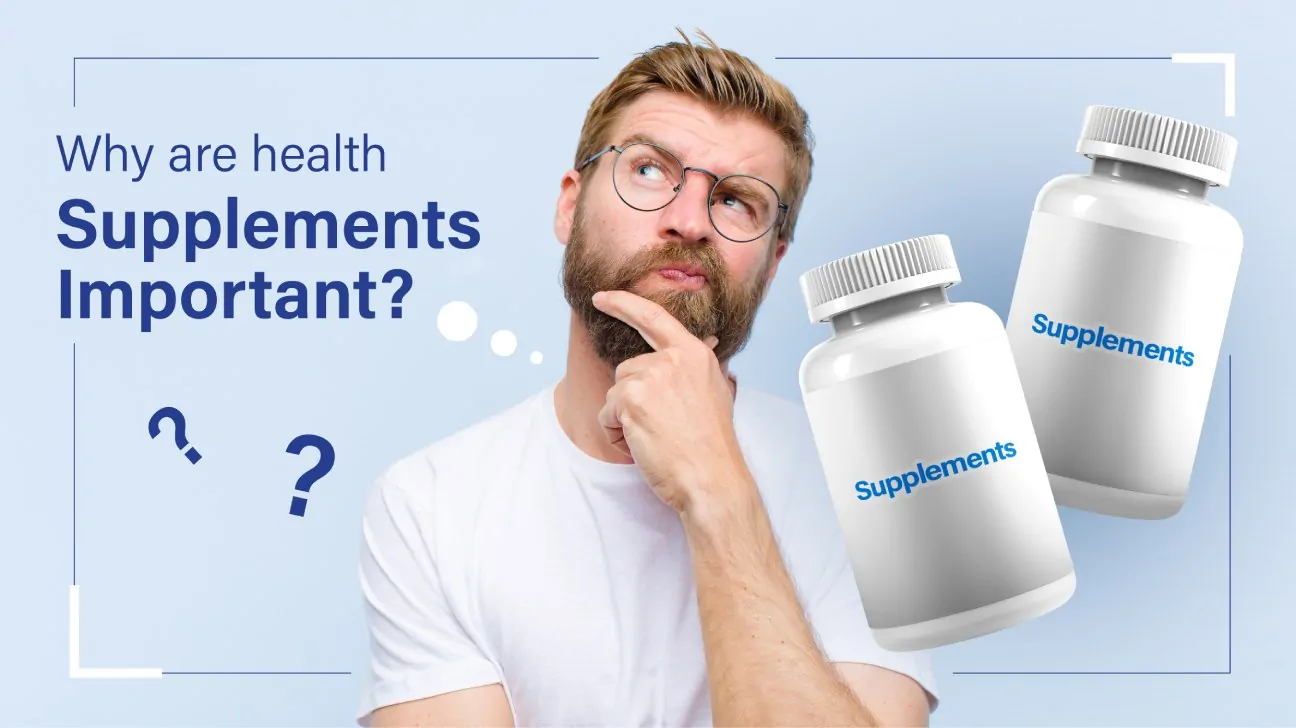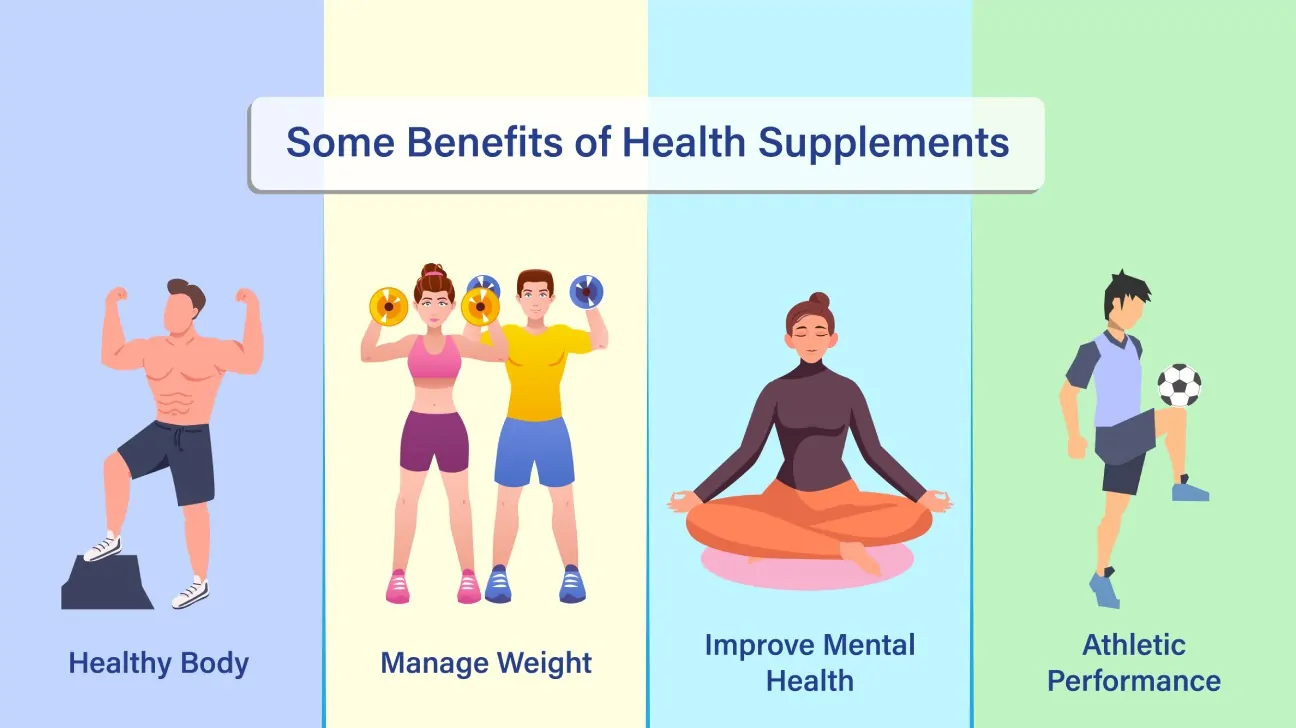Why are health supplements important?

Minerals and vitamins plays an important role in human health. There are so many different dietary ideas floating around the world. With the internet being so robust and ever-growing, it’s hard to know who is telling the truth about what we should be doing (or not doing). A lot of times we hear health specialists or doctors say that we should be taking vitamins and supplements daily. But why take supplements? Are they really necessary?

Health Supplements
Here we give you 8 solid reasons why we think taking supplements is something you should be doing, at least if you care about your health.
8 Ideas to Answer “Why Take Supplements?”
1)America Is Known For Junk Food
We are all aware that America gets a bad rap for eating foods that are less than healthy. We have found a way to make food cheaper, and a lot of times that means heavily processed. The foods that most of us eat are hardly nutritious – they are not organic or even fresh, and more often than not they are loaded with salt, fat, sugar, or unhealthy additives!
Of course, we do eat food that isn’t processed, like red meat and poultry, but even then they are normally full of growth hormones, GMO’s and god knows what else.
There was a report in 2011 done by the Journal of Nutrition whose results concluded that many Americans are deficient in key nutrients.
2) We Encounter More Toxins Than We Used To
The world is a much different place from when our ancestors lived here. Every day we are breathing in toxins that we release into the world, and we haven’t even discussed what we put into our bodies on purpose! In our modern and ever-changing world, our bodies need more nutrients to handle and combat those toxins. The nutrients in food today is not up to the challenge, especially when you think about all of the food that we eat that is low in healthy vitamins as it is.
Taking daily vitamins and supplements can help with the unhealthy poisons we experience in our everyday environment.
3) Producers Create Genetic Hybrids That Have Low Nutrition Values
There are producers (the makers of our fruits and veggies) that are learning how to create hybrid forms of these foods to enhance them in some way. Either changing their color, weight, or even how long they last on the shelf. This kind of genetic manipulation just drops the nutrition values. What looks like a fat, delicious orange is nothing more than sugar and water, and probably indigestible cellulose.
In 2013, the New York Times stated that we genetic manipulation like what is found in America is simple, “breeding the nutrition out of our food.” Which makes sense, right? The more we try to manipulate nature and the way it grows, the less we are maintaining the nutrition value. Supplements can help offset the lack of nutrients from our daily fruits and veggie intake.
4) Even Our Water is Depleted of Minerals
The way modern water production methods work, coupled with the excessive use of filters, even our water is depleted of minerals. For centuries, we as humans have relied on the nutrient-rich water sources to get the essential minerals our bodies need.
The World Health Organization revealed in 2005 that many important minerals like magnesium are being removed from the water in all of North America. In our world today, we are missing out on key resources because we believe in over filtering from the source.
5) Social Depletion Means Depriving Our Food of Nutrition
According to USDA records and a 2004 report in the Journal of the American College of Nutrition, nutritional values for fruits and vegetables today are below what you could get in 1970s. Its because of commercial farming and all of the powerful fertilizers we use that our soils have been significantly deprived of vital nutrients. And not just in the United States, but also world-wide. Soil is becoming less and less nutrient rich and lacking in the essential vitamins and minerals we need.
The food we eat is only as good as the soil is grows in.
6) Long Distance Produce
A lot of the produce you see at your local grocery store was sent from across the country or maybe even around the world. The Center for Environmental Farming Systems says that vitamins in certain produce are depleted because they have been shipped from long distances and stored for long periods before we even see them on the shelves.
Sometimes, produce is harvested weeks or months before your purchase! Buying local and organic produce is your best option for the maximum amount of nutrition! Think about going to Farmer’s Markets, or even starting your own garden!
7) People Today Don’t Absorb Nutrients Very Well
As we get older, and the food in our world changes, we have a harder time digesting food and retaining the nutrients we need. Especially because, as we get older, we also take more medications, and that could interfere with nutrient absorption. Half of the U.S. population has inadequate stomach acid, according to the Poliquin Group, which means the food we eat isn’t getting absorbed properly.
Vitamin supplements can help compensate for nutrients lost during digestion and consumption.
8) You Need Nutrients To Exercise
Your body demands more nutrients when you exercise for proper energy production and recovery. Supplements can bridge the gap between the nutrients we need and the food that is lacking them. The more you exercise, the more your body needs to maintain optimum wellness (read more in the U.S National Library of Medicine.)
So, why take supplements? Unfortunately, a “good, balanced” diet is not enough to be healthy. When you take into account the combination of poor food choices, over-processed foods, and poor farming practices, the nutrition we eat is pretty much sub-standard. Many people (including the elderly, vegans, alcoholics, and those with absorption problems) were not getting an adequate vitamin intake. Especially in today’s society, taking supplements is an essential step towards optimum wellness!
Role of supplements in Kids
If you believe the ads, every kid needs a daily Flintstones or gummy bear vitamin. But is it true?
Not necessarily so, the experts agree. Ideally, kids should get their vitamins from a balanced, healthy diet that includes:
- Milk and dairy products like cheese and yogurt
- Plenty of fresh fruits and leafy, green vegetables
- Protein like chicken, fish, meat, and eggs
- Whole grains like steel-cut oats and brown rice
Which Kids Need Vitamin Supplements?
Given the reality of time-crunched parents, those well-rounded, home-cooked meals aren’t always possible. That’s why pediatricians may recommend a daily multivitamin or mineral supplement for:
- Kids who aren’t eating regular, well-balanced meals made from fresh, whole foods
- Finicky eaters who simply aren’t eating enough
- Kids with chronic medical conditions such as asthma or digestive problems, especially if they’re taking medications. (Be sure to talk with your child’s doctor before starting a supplement if your child is on medication.)
- Kids eating a lot of fast food, convenience food, and processed food
- Kids on a vegetarian or a vegan diet (they may need an iron supplement), a dairy-free diet (they may need a calcium supplement), or other restricted diet
- Kids who drink a lot of carbonated sodas, which can leach vitamins and minerals from their bodies
Top Six Vitamins and Minerals for Kids
In the alphabet soup of vitamins and minerals, a few stand out as critical for growing kids.
- Vitamin A promotes normal growth and development; tissue and bone repair; and healthy skin, eyes, and immune responses. Good sources include milk, cheese, eggs, and yellow-to-orange vegetables like carrots, yams, and squash.
- Vitamin Bs. The family of B vitamins — B2, B3, B6, and B12 — aid metabolism, energy production, and healthy circulatory and nervous systems. Good sources include meat, chicken, fish, nuts, eggs, milk, cheese, beans, and soybeans.
- promotes healthy muscles, connective tissue, and skin. Good sources include citrus fruit, strawberries, kiwi, tomatoes, and green vegetables like broccoli.
- promotes bone and tooth formation and helps the body absorb calcium. Good sources include milk and fatty fish like salmon and mackerel. The best source of vitamin D is sunlight.
- Calcium helps build strong bones as a child grows. Good sources include milk, cheese, yogurt, tofu, and calcium-fortified orange juice
- Iron builds muscle and is essential to healthy red blood cells. Iron deficiency is a risk in adolescence, especially for girls once they begin to menstruate. Good sources include beef and other red meats, turkey, pork, spinach, beans, and prunes.
Megavitamins — large doses of vitamins — aren’t a good idea for children. The fat-soluble vitamins (vitamins A, D, E, and K) can be toxic if kids get too much of them. Ditto with iron. Your kids can get too much of a good thing.
Look to Fresh Foods for the Best Vitamins
Healthy kids get their best start from what you put in your grocery cart.
Good nutrition starts by serving a wide variety of whole, fresh foods as much as possible. That’s far better than serving up fast food or convenience food — and hoping that taking a kids’ vitamin will undo any nutritional no-no’s. You’ll find the most vitamins and minerals in foods high in carbohydrates and proteins (rather than fats). By far, the most high-vitamin foods of all are fresh fruits and vegetables.
To give kids more vitamins, aim for more variety — not simply more food. Twice as many kids today are overweight than just 2 decades ago, so use kid-sized food portions, which are one-quarter to one-third the size of adult portions.
Spread the variety of foods into several small meals and snacks throughout the day. If your child won’t eat a particular food for a few days — like vegetables — don’t fret. But reintroduce those foods again a day or two later, perhaps prepared in a different way. Kids’ “food strikes” usually end by themselves.
Vitamins and Healthy Kids: Five Tips
If you do give vitamins to your kids, follow these tips:
- Put vitamins away, well out of reach of children, so they don’t treat them like candy.
- Try not to battle over foods with your kids or use desserts as a bribe to “clean your plate.” Instead, give your child a chewable vitamin after the meal. Fat-soluble vitamins can only be absorbed with food.
- If your child is taking any medication, be sure to ask your child’s doctor about any drug interactions with certain vitamins or minerals. Then the supplement won’t boost or lower the medication dose.
- Try a chewable vitamin if your child won’t take a pill or liquid supplement.
- Consider waiting until a child reaches age 4 to start giving a multivitamin supplement, unless your child’s doctor suggests otherwise.
Sound nutrition plays a role in your child’s learning and development. So, rather than relying on cartoon characters selling supplements, commit to feeding a range of healthy foods to your kids.
Dietary supplements for elderly
Dietary supplements can be beneficial at any age, but they can also have unwanted side effects, such as unsafe prescription drug interactions. They could also not work at all.
What is a dietary supplement?
Dietary supplements are substances you might use to add nutrients to your diet or to lower your risk of health problems such as osteoporosis or arthritis. Dietary supplements come in the form of pills, capsules, powders, gel capsules and tablets, extracts, or liquids. They might contain vitamins, minerals, fiber, amino acids, herbs or other plants, or enzymes. Sometimes, the ingredients in dietary supplements are added to foods and drinks. A doctor’s prescription is not needed to buy dietary supplements.
Should I take a dietary supplement?
Eating a variety of healthy foods is the best way to get the nutrients you need. However, some people may not get enough vitamins and minerals from their daily diet. When that’s the case, their doctors may recommend a dietary supplement to provide missing nutrients.
If you are thinking about using dietary supplements:
- Learn. Find out as much as you can about any dietary supplement you might take. Talk with your doctor, pharmacist, or a registered dietitian. A supplement that seemed to help your neighbor might not work for you. If you are reading fact sheets or checking websites, be aware of the source of the information. Could the writer or group profit from the sale of a particular supplement? Read more about choosing reliable health information websites.
- Remember. Just because something is said to be “natural” doesn’t mean it is safe or good for you. It could have side effects. It might make a medicine your doctor prescribed for you either weaker or stronger. It could also be harmful to you if you have certain medical conditions.
- Tell your doctor. Before deciding to start taking a dietary supplement to treat any health condition, check with your doctor. Do not take a supplement to try to diagnose or treat any health condition without first checking with your doctor. Learn how medications can interact with dietary supplements. For more information, visit the National Center for Complementary and Integrative Health.
- Buy wisely. Choose brands that your doctor, dietitian, or pharmacist recommend. Don’t buy dietary supplements with ingredients you don’t need. Don’t assume that more is better — it can actually be harmful to take too many supplements or those with a very high concentration of a nutrient. It is possible to waste money on unneeded supplements.
- Check the science. Make sure any claim about a dietary supplement is based on scientific proof. Look for the United States Pharmacopeia (USP) verified mark. USP verifies the identity, quality, strength, and purity of supplements. Information on some dietary supplements is available on MedlinePlus, but it’s important to note that most supplements listed have limited evidence of any benefit. If something sounds too good to be true, it probably is.
- Be a savvy consumer. Some advertisements for dietary supplements in magazines, online, or on TV promise that some of these products will make you feel better, keep you from getting sick, or even help you live longer. It’s important to know that often, there is little, if any, science supporting these claims.
Dietary supplements for older adults
People over age 50 may need more of some vitamins and minerals than younger adults do. Your doctor or a dietitian can tell you whether you need to change your diet or take a vitamin or mineral supplement to get enough of these:
- Calcium: Calcium works with vitamin D to keep bones strong at all ages. Bone loss can lead to fractures in both older women and men. Calcium is found in milk and milk products (fat-free or low-fat is best), canned fish with soft bones, dark-green leafy vegetables like kale, and foods with calcium added, such as breakfast cereals.
- Vitamin D: Most people in the United States consume less than recommended amounts of vitamin D. Talk with your doctor about adding vitamin D-fortified milk and milk products, vitamin D-fortified cereals, and fatty fish to your diet, or using a vitamin D supplement.
- Vitamin B6: This vitamin is needed to form red blood cells. It is found in potatoes, bananas, chicken breasts, and fortified cereals.
- Vitamin B12: This helps keep your red blood cells and nerves healthy. While older adults need just as much vitamin B12 as other adults, some have trouble absorbing the vitamin naturally found in food. If you have this problem, your doctor may recommend that you eat foods like fortified cereals with this vitamin added, or take a B12 supplement. Strict vegetarians and vegans are at greater risk of developing vitamin B12 deficiency because natural food sources of vitamin B12 are limited to animal foods. Talk with your doctor about whether taking a B12 supplement is right for you.
Vitamin and mineral recommendations for people over 50
The Dietary Guidelines for Americans, 2020-2025 (PDF, 30.9M) recommends how much of each vitamin and mineral men and women of different ages need. For example:
- Vitamin B12: 2.4 mcg (micrograms) each day. If you are taking medicine for acid reflux, you might need a different form, which your health care provider can give you information about.
- Calcium: Women over age 50 need 1,200 mg (milligrams) each day. Men need 1,000 mg between age 51 and 70 and 1,200 mg after 70, but not more than 2,000 mg a day.
- Vitamin D: 600 IU (International Units) for people age 51 to 70 and 800 IU for those over 70, but not more than 4,000 IU each day.
- Vitamin B6: 1.7 mg for men and 1.5 mg for women each day.
Sometimes, too much of a vitamin or mineral can be harmful. Most if not all of your daily vitamins and minerals should come from food. When thinking about whether you need more of a vitamin or mineral, think about how much of each nutrient you get from food and drinks, as well as from any supplements you take. Check with a doctor or dietitian to learn whether you need to supplement your diet.
Source
What are antioxidants?
You might hear about antioxidants in the news. These are natural substances in food that might help protect you from some diseases. Here are some common antioxidants that you should be sure to include in your diet:
- Beta-carotene: Found in fruits and vegetables that are either dark green or dark orange
- Selenium: Found in seafood, liver, meat, and grains
- Vitamin C: Found in citrus fruits, peppers, tomatoes, and berries
- Vitamin E: Found in wheat germ, nuts, and sesame seeds; and canola, olive, and peanut oils
Currently, research results suggest that large doses of supplements with antioxidants will not prevent chronic diseases such as heart disease or diabetes. In fact, some studies have shown that taking large doses of some antioxidants could be harmful. Again, it is best to check with your doctor before taking a dietary supplement.
Herbal supplements and older adults
Herbal supplements are dietary supplements that come from plants. These types of supplements are taken by mouth, whether it’s by a capsule, tablet, powder, or liquid.
A few that you may have heard of are ginkgo biloba, ginseng, echinacea, and black cohosh. Researchers are looking at using herbal supplements to prevent or treat some health problems, but it’s too early to know if these are both safe and useful. Previous studies of certain herbal supplements have not shown any benefits.
It’s important to know that just because a supplement is natural, or comes from plants, that doesn’t necessarily mean it’s safe.
Reference: https://www.webmd.com/parenting/guide/vitamins-for-kids-do-healthy-kids-need-vitamins
Reference: https://austinprecisionmedicine.com/post/why-take-supplements-8-healthy-reasons-why-its-necessary


